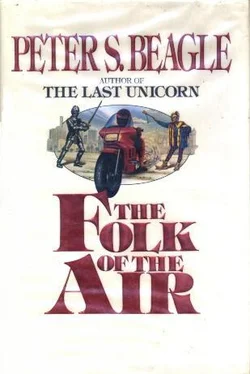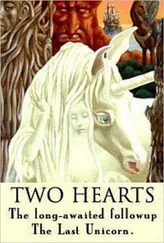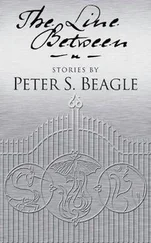Farrell watched him walk back to his students, eyes down, feet a bit pigeon-toed. The splotched polo shirt clung to his protuberant shoulder blades. He nodded the two fallen fighters to their feet and confronted the half circle of masked boys. Lovita Bird said, “That man is seriously crazy.”
Hamid folded his long legs under him and leaned back against the wall, his chestnut eyes looking very far away. “Might be this is what keeps him sane.”
“It’s strange,” John Erne was saying. “The one thing I really know about broadsword fighting you’ll all have to learn from someone else. The first man you face in the Whalemas Tourney will teach you that it’s very important to use your shield well and also that you don’t know how. You’ve gotten good enough with the sword, all of you, but your idea of shield work is peeking around an ironing board.” He sighed and shrugged, twisting his mouth. “One reason I try to avoid watching my students fight.”
A large, blond boy with a swagbelly like a laundry bag spoke up. “Sir Fortinbras—the one I’m supposed to be squire to—says a shield ought to be as big and light as you can manage it. Without making it so light it splits right off.”
“Sir Fortinbras hasn’t improved as a fighter in three years, for just that reason,” John Erne replied calmly. “No more has Raoul of Carcassonne or Simon Widefarer. Those kite shields they all use were made for men on horseback—they’re pathetic things to be dragging around in close work. They blind you exactly as much as they protect you, they throw your balance off just horribly, and they stop your technique right where it is. I could go through a field of those things with a butter knife. Foolishness.”
He jerked a forefinger at the Japanese student, who was scowling avidly at him over his folded arms. “Most of you probably feel a bit superior to the Ronin Benkei, watching him struggling with that manhole cover of his all this time. But the Ronin Benkei dances with his shield, very old dances of attack and defense called katas . He tells me that he does it twice a day. Can anyone here do that? Martin? Arnuif? Orlando? Can you dance with your plywood weapons?” They shrugged, grinning. The Ronin Benkei’s expression did not change.
“I’m embarrassed to admit that I can’t either,” John Erne said. He drew his own shield out of a frayed, green flannel bag that hung on the back of a chair. His shield was made of steel backed with leather, like the Ronin Benkei’s, but it was circular in shape and moderately convex. Two reinforcing steel bands crisscrossed it, surmounted where they met in the center by a heavy leather boss ornamented with a painted pattern of leaves and moons.
“We’re going to go on to the weapons pass,” John Erne announced. “The idea of the pass—unlike the overrun, which, as we know, is nothing much but crashing into your man in hopes of knocking him off balance—is to open up the side you’re after without leaving yourself vulnerable. You’ll see a lot of clever maneuvers like these at the Whalemas Tourney. Some of them will be aimed at you, so you’d better learn how to guard against them and how to do them yourselves.” He beckoned to the boy called Squire Arnulf. “Approach and have at me.”
Arnulf donned his saber mask, adjusted the long shield on his arm, and set himself to face the combat master. John Erne, standing indifferently straight and scuffing his feet, launched an artless, looping head cut which the boy picked off easily, raising his shield a few inches. For a moment, the shield’s arc blocked his vision; in that moment, John Erne did a stiff little dance step and rushed him, lashing like a scorpion into the sudden gap between shield edge and flailing sword as he went by. Arnulf swayed, and his sword arm rose to his featureless head. John Erne sprang back, no trace of triumph on his face, but only a puckered academic earnestness. “Now how did I do that?” he demanded.
Arnulf did not answer, but the Ronin Benkei shifted slightly to catch the combat master’s attention. “Your back leg,” he said. “You moved your back leg way around to your left for the first cut, and that lured his shield out of line, even before you got it up in front of his eyes. Then you threw your weight back and pivoted and went in.” His voice was very soft and uninflected.
John Erne nodded curtly. “The important thing is keeping your own shield in the same position all the way through. Move those shoulders even a little, and you wind up tied in a knot with Sir Gregory the Grungy about to stave in the back of your head.” He laughed his soundless laugh again, but his cheeks were flushing rustily as he looked at the students. He said, “Remember, my gentlemen, this is a representation of death. This has no point system, no electronic umpires, no Olympic team. This is a matter of someone trying very hard to split your skull with eight pounds of iron. If you don’t know that when you’re fighting, absolutely, then you’re missing the point of everything, and I really don’t want you in my class.” Farrell heard a faint whiny rustle as John Erne drew breath and realized that the combat master was an asthmatic.
He asked Hamid about it later, as they were walking away from the old house with Felix Arabia, Lovita, and Matteo. The Saracen nodded, the scattering of silver hairs in his beard glinting in the blue city moonlight. “It’s under control now, but I guess it came near killing him when he was young. That’s the one truly personal thing I know about him.”
Matteo said, “Well, that’s probably why he’s so obsessed by this stuff, he’s compensating.”
But Felix Arabia hooted him down. “Fast-food psychology. Lovita’s right, the man’s crackers, that’s all. Functional, pretty harmless—although I can imagine circumstances where maybe he wouldn’t be so harmless—but a stoneground Wheat Thin.”
They were still arguing when they parted from Farrell, Lovita, and Hamid, crossing the street to catch a bus. On the corner Matteo called back to Farrell, “Basilisk has rehearsals every Wednesday night. My place—Hamid’ll tell you how to get there.” Farrell waved and smiled.
“You going to join up with them?” Lovita asked.
Farrell said nothing until they turned down the side street where he had parked Madame Schumann-Heink illegally. “The only thing I’ve ever joined was the linoleum layer’s union. I haven’t played with a group in years. Probably wouldn’t fit in too well.”
Hamid said, “Do it. They play good music and they’re a kick to work with. And you can be part of the League or not, nobody expects the musicians to do all that much. Yeah, Basilisk would be just about right for you.”
There was a parking ticket flapping like a trapped moth under Madame Schumann-Heink’s windshield wiper blades. Farrell put it in his pocket and turned with his hand on the door latch. He said, “I’ve met Prester John.” Hamid’s face became very still. Farrell went on, “You’re a griot , you’re a rememberer, you know everything about the League. Tell me what happened to Prester John.”
Hamid ibn Shanfara, whose true name Farrell never learned, glanced sideways at Lovita Bird, but it was the Queen of Nubia who looked disdainfully back at him. She had been largely silent during the combat class, paying elaborate attention to her nails and to an imagined stain on her leather skirt. She said to Farrell, “Honey, the man can’t tell you. I mean, he won’t ever tell me what went down about all that, so he damn sure better not just decide to drop it all on you now.” Hamid put his arm around her; it was the first awkward move that Farrell had seen him make. Lovita said, “It’s that girl, I know that much, anyway. Something real nasty she did, but won’t nobody talk about it. Not him, nobody.”
Читать дальше












